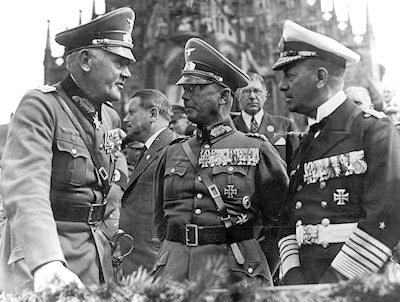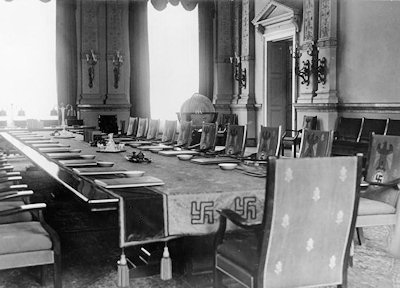

Hitler Reveals War Plans
From the very beginning of his career until his dying day, Adolf Hitler had just two major goals. His primary goal was the forcible acquisition of Lebensraum (living space) for the German people. Secondly, he desired some kind of final reckoning with the Jews.
The first steps toward Lebensraum occurred in 1935 when Hitler openly violated the Treaty of Versailles by reintroducing military conscription and began rapidly rebuilding the German Army. Hitler then managed to negotiate a naval pact with Britain allowing Germany to have a Navy totaling 35 percent of Britain's fleet, along with a submarine fleet equal in size.
Hitler realized that world leaders were becoming increasingly nervous as Germany re-armed, given the country's role in the catastrophic World War some twenty years earlier. He continually reassured diplomats, and anyone else who would listen, that Germany's military buildup was solely a defensive measure designed to put the country on an equal footing with surrounding nations. After all, he would ask, didn't Germany have a right to defend itself like every other nation?
| ADVERTISEMENT |
Hitler would answer his own question in the affirmative while in the same breath promising that Germany would never break the peace. To emphasize the point, Hitler uttered some remarkable statements concerning the horrors of war, which he had witnessed first-hand as a frontline soldier. On May 21, 1935, he declared during a major speech: "The blood shed on the European continent in the course of the last three hundred years bears no proportion to the national result of the events. In the end, France had remained France, Germany Germany, Poland Poland, and Italy Italy. What dynastic egotism, political passion and patriotic blindness have attained in the way of apparently far-reaching political changes by shedding rivers of blood has, as regards national feeling, done no more than touched the skin of nations. It has not substantially altered their fundamental characters. If these states had applied merely a fraction of their sacrifices to wiser purposes the success would certainly have been greater and more permanent."
The leaders of France and Britain, and Hitler's smaller next-door neighbors, were naturally quite impressed by such sentiments. Years later, they would find out that on the very day Hitler spoke those words he had also approved a secret Reich Defense Law which put Germany on a war economy and revived the Army's General Staff organization, which had been banned after World War I.
Most diplomats mistakenly took Hitler at his word and thought he was a man they could reason with, perhaps even trust. This, of course, was precisely what Hitler wanted them to think. He had them all at a distinct disadvantage, since they could never actually know what was in his mind. They didn't know they were dealing with a man who routinely used lies as a tool to achieve his long-range goals.
Hitler could look anyone in the eye and lie with the utmost sincerity. He would also lie to the whole world via radio broadcasts, endlessly proclaiming his desire for peace, even his love of peace, all the while secretly preparing for another catastrophic war.


The people of Germany and many of the Reich's top leaders had no idea of the depth of their Führer's cynicism, but they would all find out sooner or later. For Germany's top Army leaders that revelation came on November 5th, 1937, when Hitler called a secret conference and bluntly outlined his plans to acquire Lebensraum at the expense of other nations.
The meeting was convened inside the Reich Chancellery in Berlin at 4:15 p.m. Incredibly, earlier on that same day, Hitler had met with Poland's ambassador and signed a treaty assuring that Germany would respect Poland's territorial rights.
Present at the secret afternoon conference were Germany's two Army commanders; Field Marshal Werner von Blomberg, the Commander-in-Chief of the German Armed Forces, and General Werner von Fritsch, the Commander-in-Chief of the Army. Also in attendance was Navy Chief Erich Raeder, along with Hermann Göring who headed Germany's new Air Force (among his many other duties). Foreign Minister Constantin von Neurath was there, along with Colonel Friedrich Hossbach, Hitler's military adjutant, who took the complete minutes of the meeting which has come to be known as the Hossbach Conference or Hossbach Memorandum.
Hitler began the four-hour-long meeting by asking each of the men to swear an oath of secrecy. He then informed them that in the event of his untimely death the following exposition should be regarded as his last will and testament.
He started the exposition by explaining his theory of Lebensraum, stating that Germany had "a tightly packed racial core" and that the Germans were entitled to "greater living space than in the case of other peoples."
"The history of all ages – the Roman Empire and the British Empire – had proved that expansion could only be carried out by breaking down resistance and taking risks. there had never been spaces without a master. the attacker always comes up against a possessor," Hitler declared. "The question for Germany ran: where could she achieve the greatest gain at the lowest cost?"
He pointed out two major obstacles; "two hate-inspired antagonists, Britain and France, to whom a German colossus in the center of Europe was a thorn in the flesh. "
"Germany's [Lebensraum] problem could only be solved by means of force," Hitler said, but "there remain still to be answered the questions 'when' and 'how'. "
Hitler wanted to resolve the Lebensraum issue by 1943 to 1945 at the very latest to guard against military obsolescence, the aging of the Nazi leadership, and, "it was while the rest of the world was still preparing its defenses that we were obliged to take the offensive."
Although Hitler's ultimate goal was to acquire Lebensraum in the East, namely Russia, he focused the entire conference on his first objectives, the seizure of Austria and Czechoslovakia to protect Germany's eastern and southern flanks. Hitler outlined three strategies to achieve this, each one designed to capitalize on the military and political weaknesses of France and Britain.
In the first scenario, Hitler would wait until 1943 when rearmament was complete and France and Britain would be heavily outgunned. In the second, he would act sooner by keeping a close eye on France's internal political problems, waiting for a chance to strike at Czechoslovakia in the event that France was weakened by a major crisis such as a civil war. In the third, he would strike as early as 1938 at both Austria and Czechoslovakia if France got bogged down in a military conflict with some other country, such as Germany's new ally, Fascist Italy.
Hitler's casual acceptance of the immense risks of starting a large-scale war in Europe shocked those in attendance, especially Blomberg and Fritsch who, according to Hossbach's notes, "repeatedly emphasized the necessity that Britain and France must not appear in the roles of our enemies."
They were not objecting on any moral grounds to Hitler's war plans but merely out of practical consideration. Germany, in their opinion, was far from being ready for war, and even by 1943 would not be adequately armed.
Following the conference, an overwhelmed Neurath went home and suffered a series of heart attacks. Blomberg and Fritsch, meanwhile, maintained their steadfast opposition to Hitler's plans. Their reaction was completely unacceptable to the F ü hrer and he decided they would both have to go. To dump the two generals, he would rely on the expert services of his masters of treachery, Himmler and Heydrich.
Copyright © 2001 The History Place All Rights Reserved

Terms of use: Private home/school non-commercial, non-Internet re-usage only is allowed of any text, graphics, photos, audio clips, other electronic files or materials from The History Place.